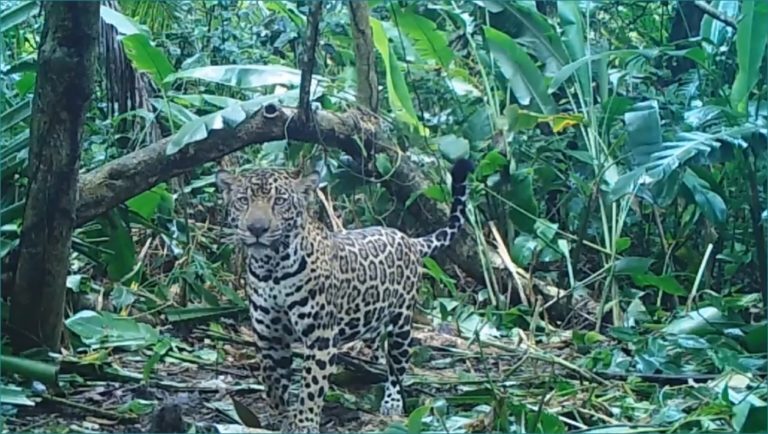
Jaguars in Tortuguero
From $1,890…
8 Nights, Lodging, Most Meals, Research Training, In-Country Transfers, Canal Tour
Since the late 1990s, Sea Turtle Conservancy researchers in Tortuguero, Costa Rica, have been documenting a steady increase in the number of nesting green turtles preyed upon by jaguars. In 2012, Coastal Jaguar Conservation began to investigate this increasing predator-prey interaction and the overall dynamics of the Tortuguero jaguar population.
Despite this somewhat concerning trend, the number of green turtles killed each year by jaguars is quite small in proportion to the size of the nesting colony, and the loss from predation, so far, has only had a negligible impact on recovery efforts for Tortuguero’s green turtles. In contrast, jaguars kill a large proportion of the leatherback turtle nesting population every season, which may be of concern. Meanwhile, there is growing evidence that Tortuguero’s turtle population plays a major role in the survival, health and unique behavior of an important population of jaguars.

Sea Turtle Conservancy’s research programs are scientific research projects, not guided tours. STC makes every effort to describe field conditions accurately, but fieldwork in remote locations is a delicate business and prone to last-minute change, flexibility is a must. STC’s programs are not package holidays! You will be assisting researchers with scientific field work at a remote field station, and when not working you will have unsupervised free time to relax and enjoy the nature surrounding you.
Eco-Volunteer Participants will assist with:
Camera trap surveys
A daily survey of the beach (Miles 5 to 8) to locate predated marine turtles by jaguars, and the installation of camera traps at these sites. Survey duration: all morning (starting at 6am). Size group: 1-4 volunteers.
A once monthly survey of the permanent camera trap stations located along the entirety of the beach (Miles 3 to 18). Survey duration: all day (starting between 5 and 6am). Size group: 4 volunteers. For this survey, STC will facilitate transportation to pick up the team at Jalova river mouth in the afternoon.
Jaguar predation on marine turtles (known as ‘JagWalk’)
A once monthly survey consisting of walking the entirety of the beach (Miles 3 to 18) to collect data on marine turtles predated by jaguars and jaguar presence. Size group: 4 volunteers.
Eco-Volunteers must be 15 years or older (under 18 must be accompanied by an adult). This experience is ideal for educators, couples, spring breakers, groups, or anyone who is interested in helping sea turtles and making a difference. Discounts are available for groups of six or more.
A passport valid through the date of return is required. Non-U.S. citizens should contact the Costa Rican Embassy for visa requirements. Upon registering, you will be sent a Field Station Manual providing packing tips, travel information, STC policies and site information.

COVID-19 Update: While STC no longer requires a negative covid test before arriving, we still require proof of Covid-19 vaccination for all eco-volunteers.
All Eco-Volunteers must be in good physical health. It is important that all travelers are aware of the demanding physical conditions before signing up. We need you to accurately evaluate your ability to meet the conditions detailed below in order to safeguard your health and safety, and ensure that you can participate fully and effectively. If you feel you do not meet these considerations, please reconsider taking part in this program.

Phobias to snakes and insects may pose a problem, although encounters with snakes are unlikely. If you are allergic to insect bites, bees or wasps please come prepared with appropriate medication or epi-kit. To avoid dehydration and other heat related you must bring a water bottle in order to stay hydrated during field activities. Diabetics without previous experience of how physical exertion in a hot climate may affect their insulin levels are advised to speak with a doctor.
The minimum age for participants is 18 years old without a parent or legal guardian and 15 years old with a parent or legal guardian.
While there are no extreme physical conditioning or psychological demands, be sure you are able to walk at least 5 or 7 miles for 4 or 5 hours. You should be able to carry about a 5 lb pack (backpacks are used to carry the team’s field equipment) while hiking through rainforest. Walking on uneven ground is difficult and not recommended for people with heart conditions, prosthetic limbs, or limited mobility. Minor injuries or scrapes due to falls or tripping over obstacles can occur during work.
This is an exciting way to participate in wildlife conservation while vacationing in an exotic, tropical location. What makes STC’s Eco-Volunteer program even better is that your money will be supporting conservation. Plus, a portion of your fee is tax deductible!
Program runs from June through October. Options include 1 or 2 week sessions..
Prices start at $1,890 per person, all inclusive in-country. This price does not include international airfare.
|
2022 Program Rates |
Session Length |
STC Dormitory |
STC Scientist Residence |
Eco-Lodge |
|
Jaguar Program |
1 week |
$1,929 |
$2,109* / $1,890** |
$2,684* / $2,265** |
|
Jaguar & Turtle Combo |
2 weeks |
$2,536 |
$2,926* / $2,567** |
$4,079* / $3,399** |
All prices are in US$ and are per person. * Single Occupancy / ** Double Occupancy.
|
||||
What will my accommodations and meals be like?
Eco-volunteers will stay at STC’s John H. Phipps Tortuguero Biological Field Station, located in a tropical rainforest setting, and just steps from the black sand beach. Modern plumbing, indoor showers, and potable water allow for a rustic yet comfortable stay. Meals, prepared Caribbean-style by a local cook, are served three times a day.
There are three types of accommodations available:
$ Rustic, dorm-style living, includes 3 bunk beds with up to 6 people per room and community bathrooms.
$$ Scientist residence includes private bedrooms and bathrooms with a common living area.
$$$ Eco-lodge has completely private accommodations only a ten minute walk from the research station. (Visit the Mawamba Lodge website)
To reserve your place in one of the above research sessions, contact Sea Turtle Conservancy directly as soon as possible by using our convenient online form. Register Now
To register:
1) Submit the Online Registration Form for initial registration, confirmation of dates, and contact number for travel information.
2) Secure your reservation with a $200 deposit as soon as possible.